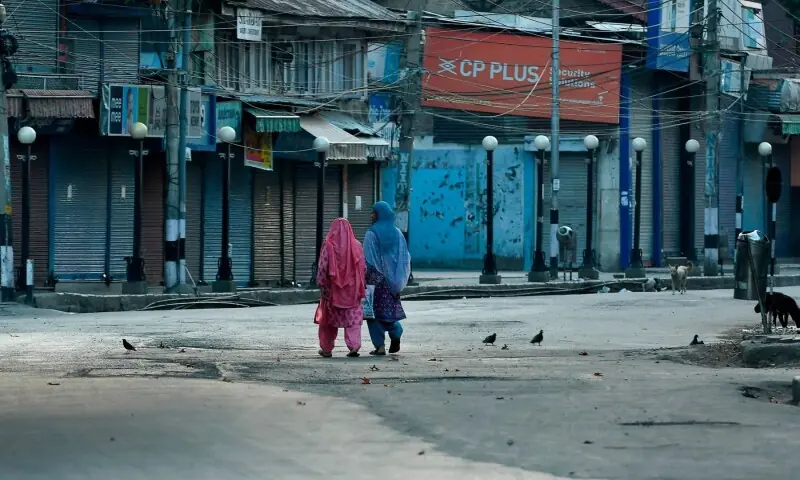Indian authorities raid offices of Kashmir Times in crackdown against ‘anti-national’ content


The State Investigation Agency (SIA) of the India-Occupied Kashmir on Thursday raided the office of the region’s oldest English news agency, Kashmir Times, as part of the SIA’s action against media networks that are allegedly “aiding separatist narratives,” Indian media reported.
A statement issued by the Kashmir Times editors, Prabodh Jamwal and Anuradha Basin, said that “coordinated crackdown on the Kashmir Times [is] yet another attempt to silence us.”
According to the Indian Express, the raid was carried out following the registration of a first information report (FIR) alleging the “organisation’s involvement in anti-national activities and attempts to spread disaffection against the country.”
As per “official sources, the FIR mentions alleged activities and communications that are under scrutiny for ‘potential threats to the sovereignty and integrity of India,’ the news agency said.
During the raid, SIA officials went through “documents, digital equipment and other material as part of the investigation,” adding that it began at 6am when the SIA officials called the newspaper’s manager, Sanjeev Kern, from his home to unlock the office.
Indian Express quoted officials as saying that the SIA “is likely to question Anuradha.”
“The operation is part of the agency’s continuing action against networks suspected of aiding separatist narratives or unlawful propaganda.
“The SIA maintains that no platform — media or otherwise — can be permitted to be used for advancing seditious or anti-national content,” the Indian Express reported.
‘Another attempt to silence us’
In their statement, the editors of Kashmir Times called on the authorities to cease their activities against the news agency and termed the accusations made by the FIR as “baseless”.
They stressed that “criticising the government is not the same as being inimical to the state.”
The statement continued: “In fact, it is the very opposite. A robust, questioning press is essential to a healthy democracy. Our work of holding power to account, investigating corruption, and amplifying marginalised voices strengthens our nation. It does not weaken it.”
The editors asserted that Kashmir Times — in circulation since 1954 — had always stood as a “pillar of independent journalism.”
“We have chronicled the region’s triumphs and failures with equal rigour. We have given voice to communities that would otherwise go unheard. We have asked difficult questions when others remained silent,” the statement read.
The editors claimed that they were being targeted because of their work.
“In an era when critical voices are increasingly scarce, we remain one of the few independent outlets willing to speak truth to power,” the statement said
They alleged that the accusations against them were an attempt “to intimidate, to delegitimise, and ultimately to silence.”
“We will not be silenced,” the statement said.
“We call on the authorities to immediately cease this harassment, withdraw these unfounded allegations, and respect the constitutional guarantees of press freedom,” they said, calling on the media fraternity to stand with them.
“We call on civil society, on citizens who value their right to know, to recognise that this moment is a test of whether journalism can survive in an environment of increasing authoritarianism,” the statement said.
Vowing to continue their operations, the editors stressed that “journalism is not a crime; the state may have the power to raid our offices, but it can not raid our commitment to the truth.”
“Our print edition was suspended in 2021-2022 after relentless targeting, but we continue the operation digitally,” the statement said.
In 2020, the administration of India-Occupied Kashmir sealed the offices Kashmir Times, “without any due process of cancellation and eviction”, its editor said.
The media has always been tightly controlled in India-Occupied Kashmir. Under incumbent Prime Minister Narendra Modi, press freedoms in India have steadily shrunk since he was first elected in 2014.
In 2020, India was ranked 142nd in the global press freedom index by media watchdog Reporters Without Borders, below Afghanistan and Zimbabwe.










